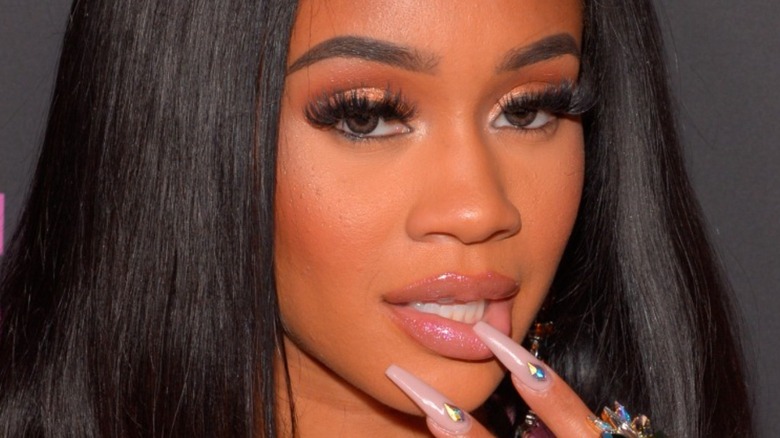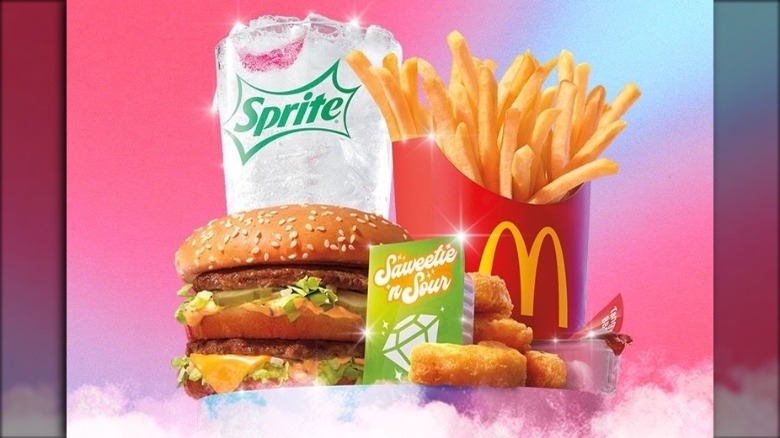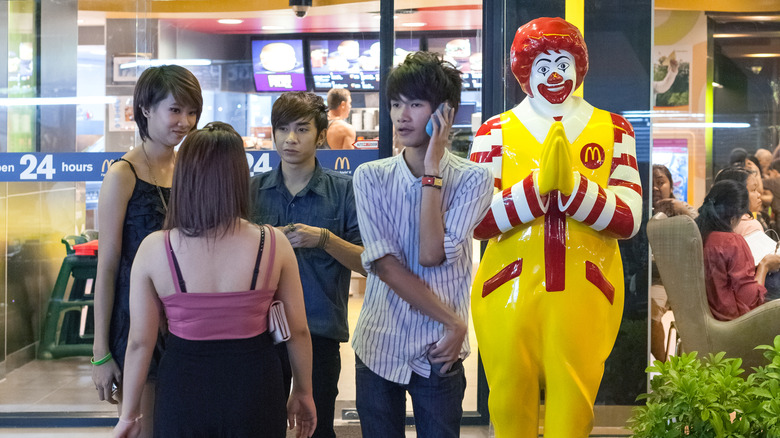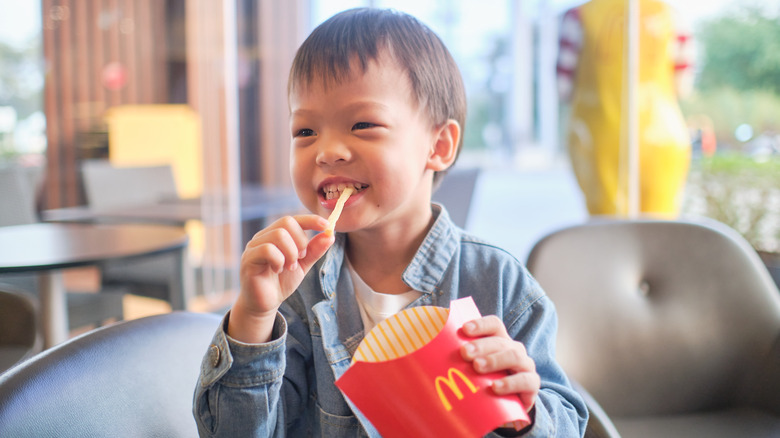What Makes The McDonald's Saweetie Meal So Concerning
We may receive a commission on purchases made from links.
McDonald's has been on quite a roll with its celebrity meals over the last year or so. It started off with the Travis Scott meal last year, then followed that up with a J Balvin one, and more recently, it had a meal named after a group of seven celebs: the members of Korean K-pop sensation BTS. The one thing all these meals have in common, in addition to causing fans of those celebs to stop eating at Wendy's and Burger King for the duration, is that they haven't been too popular with nutritionists. It seems these celebs' fandoms skew young, and younger people, on the whole, tend not to be as attentive to their nutritional needs as they should be, leading some nutrition experts to question why we should be using celebrity influencers to urge people to consume even more unhealthy foods.
McDonald's Saweetie meal is a bit new and different in that it's the chain's first one named after a female celeb. (Dunkin' beat them to the punch last year with their Charli D'Amelio drink.) When it comes to the nutritional value, however — nope, same old, same old. Mashed spoke with research neuroscientist and nutrition expert Dr. Nicole Avena, and she shared with us some real concerns she has about the Saweetie meal and about fast food celebrity meals in general.
The meal itself is lacking in nutritional value
The Saweetie Meal is a pretty decent-sized McDonald's combo consisting of a Big Mac, four chicken nuggets, a medium Sprite, medium fries, and a side of either "Saweetie 'N Sour" or barbecue sauce. All of these menu items, said to be Saweetie's go-to order, come wrapped in a cute little box decorated with snowflakes. As research neuroscientist and nutrition expert Dr. Nicole Avena notes, "Packaging has a strong influence on consumer behavior. Distinctive, interesting and exciting wrapping will make this product attractive."
As for the meal itself, she is less than impressed. According to McDonald's nutrition info, the Big Mac alone has 540 calories, the four nuggets have 190 calories, the medium fries have 380, the medium Sprite has 210, and each sauce cup (either sweet 'n' sour or barbecue) has 50 calories. Avena tells us, "The sheer calorie count of this meal is over half of a day's worth of calories. There is also a sugary drink that is full of completely empty calories."
McDonald's celebrity marketing is troubling
What makes a celebrity a celebrity is the fact that they are popular with a large number of people. No matter how talented they may be, they would not be famous without a fan base. As long as the celebrity/fan relationship is mutually beneficial, there's nothing wrong with that. It's when the celebrity's fame is used for endorsement purposes, however, that it might become problematic.
As Dr. Nicole Avena told Mashed, "Being able to purchase their favorite musician's or actor's 'go-to' meal or favorite clothing brand can make the average person feel closer to a celebrity that they admire, and it can also make celebrities seem more relatable." She acknowledges that it's fun to know that many celebs seem to enjoy the same types of fast foods that we average Joes (and Jos) also eat, but she's more concerned about the downside of such endorsements since they are generally not promoting anything with much nutritional value.
"Getting trendy, of-the-moment celebrities to endorse unhealthy foods can be harmful," she says of McDonald's marketing campaigns, "especially for young people who look up to these celebrities and see them as role models." She also expresses concern that "celebrity endorsement can also be counterproductive to efforts to move away from fast food culture, since it keeps restaurants like McDonald's relevant."
Why these celeb meals pose a particular problem for younger customers
While celebrities may be popular with people of all ages, McDonald's is deliberately choosing to market meals named for celebs who have young fan bases — no Betty White meal in the works, as far as we are aware. Why would the chain want to sell such meals to a younger audience? Dr. Nicole Avena thinks she knows the reason. As she tells us, "They are trying to target people who don't worry as much about their health yet, and who are more impressionable." Even more disturbingly, she goes on to explain, "Getting people hooked on fast food at a young age is a great way to have a lifetime customer base. The habits instilled in youth are hard to change when it comes to food, so marketing these foods toward young people can have a long-term negative impact on their health."
One of Avena's specialties is food addiction, and she authored a book called "Why Diets Fail" that specifically deals with such addictions. '"One of the things that we have learned from the research," she says, "is that foods high in sugar, and foods that are highly processed, are more likely to be addictive." These descriptors definitely apply to the Saweetie meal, as well as to McDonald's previous celeb meals and, in fact, much of its menu. "When these foods are consumed in excess," Avena cautions, "they can lead to changes in the brain that are similar to what happens when someone uses a drug of abuse." She goes on to warn that, "This can lead to behaviors such as withdrawal, craving and bingeing later on."



